In today’s dynamic business landscape, the role of procurement extends far beyond purchasing. It serves as a cornerstone for organisational efficiency, cost management, and sustainable business growth. Efficient procurement ensures timely access to essential goods and services while helping to overcome key business challenges. From increasing cost and supply chain disruptions to quality assurance and regulatory compliance, businesses face a myriad of complexities that can significantly impact their operations.
This article explores how efficient procurement helps address challenges and drive operational excellence. By strategically managing the procurement process, organisations can not only optimise costs and streamline operations but also foster innovation and competitive advantage. Through a structured approach, businesses can proactively manage risks, improve supplier relationships, and leverage technological advancements to drive sustainable growth.
Visagio’s Methods of Efficient Procurement
Efficient procurement strategies are crucial in addressing key challenges faced by businesses that require the following:
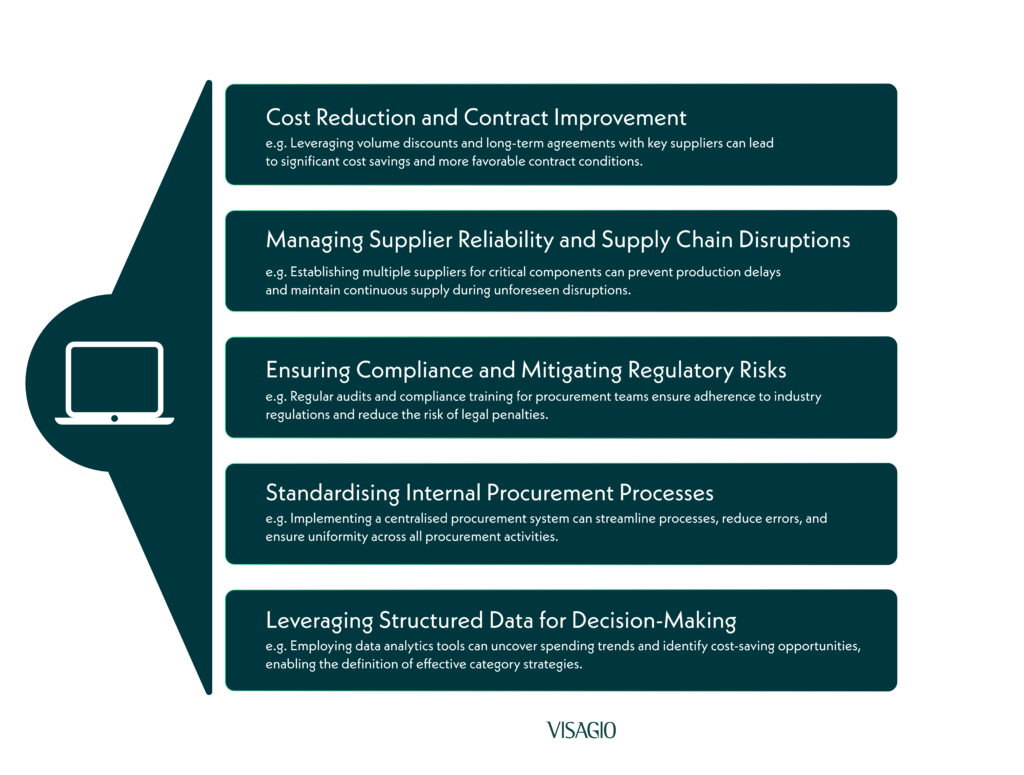

Visagio’s Methodology considers three key pillars that businesses can implement to have efficient procurement processes: Operational Optimisation, Purchasing Methodology & Supplier Management, and Procurement 4.0:
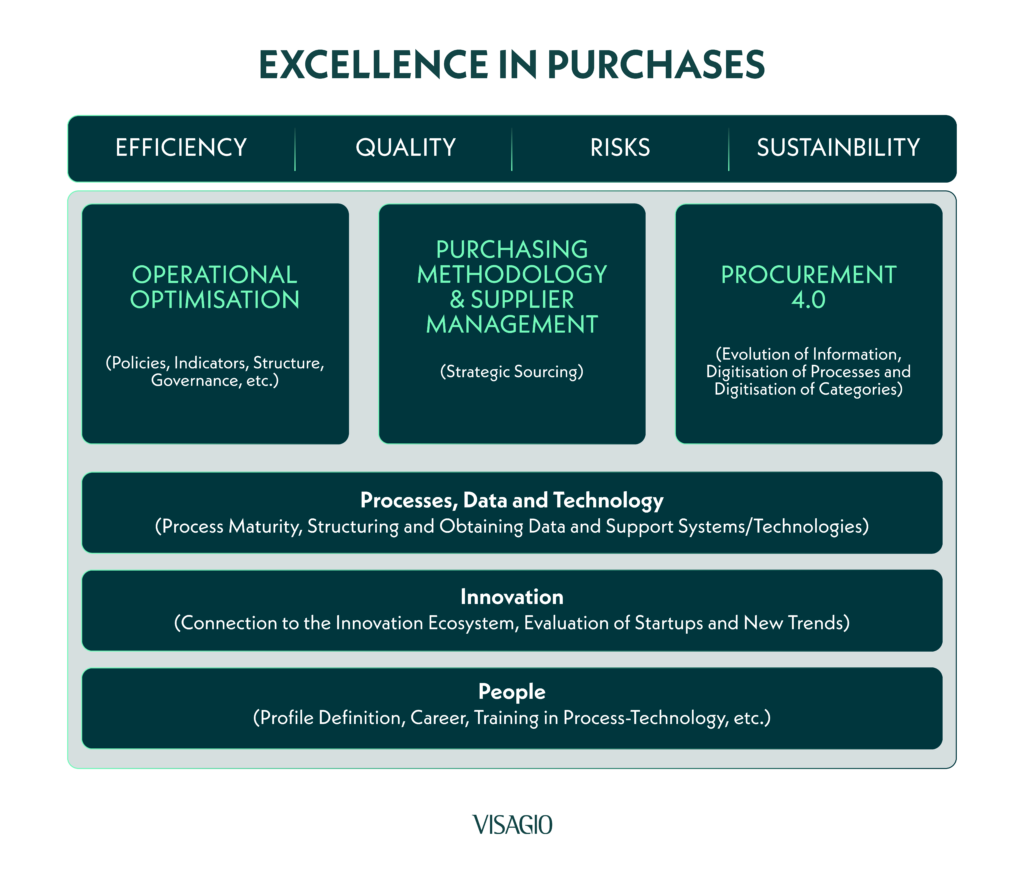

1. Operational Optimisation
To eliminate unnecessary bureaucracy and create value, businesses should streamline workflows and internal processes, adopt lean principles and continuous improvement methodologies, and strengthen negotiation strategies.
The key steps to take into consideration to optimise your operations are starting with a process redesign, prioritising the least mature and most critical areas about the identified gaps. New policies should be prepared accordingly, and key KPIs unique to the business should be measured to control the new processes. Additionally, evaluating systems to identify opportunities for improvements and automation is crucial. This includes considering the organisational structure and ensuring effective change management through structured training so that processes are maintained and evolve in the future. Strong governance frameworks should be established to oversee these processes, ensuring compliance, accountability, and continuous alignment with the business’s strategic goals.
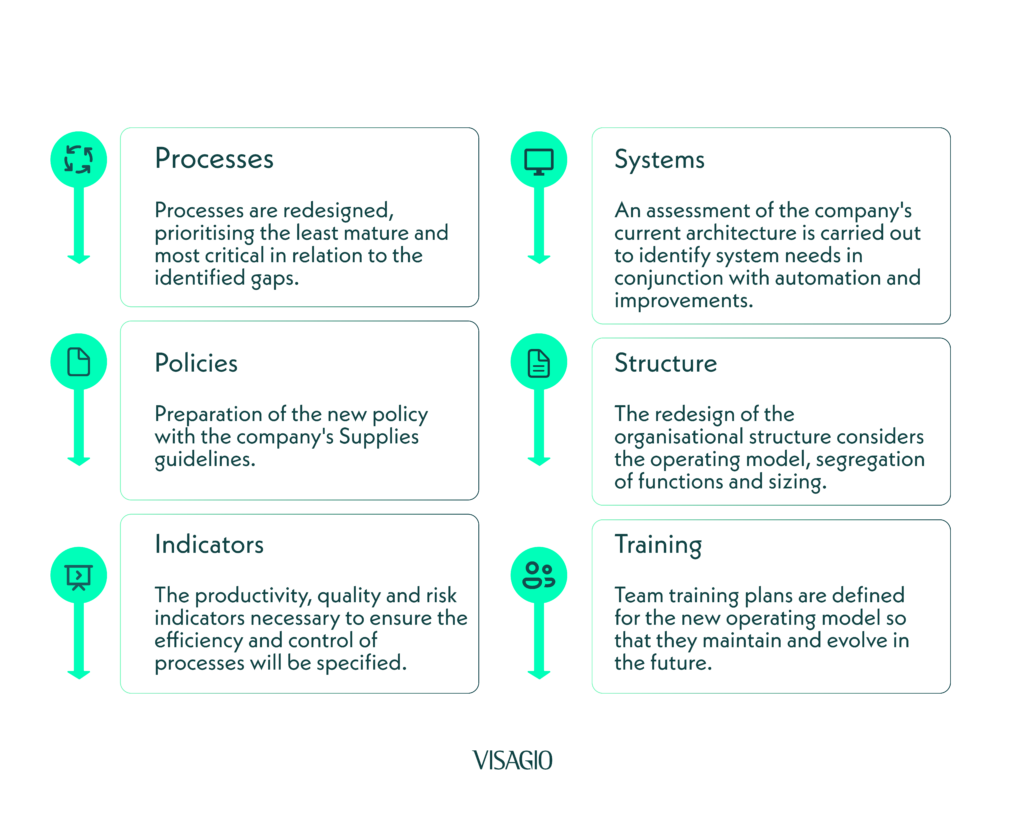

2. Purchasing Methodology & Supplier Management
The purchasing methodology encompasses the systematic process of selecting, evaluating, and acquiring goods and services to meet organisational needs. It involves defining requirements, identifying potential suppliers, conducting competitive bidding or negotiations, and finalising purchase agreements. This structured approach ensures that the procurement process is transparent, competitive, and aligned with the organisation’s strategic goals.
Supplier management, on the other hand, focuses on building and maintaining strong relationships with suppliers to ensure the consistent delivery of high-quality products and services. Effective supplier management involves evaluating supplier performance, fostering collaboration, and implementing continuous improvement initiatives. It also includes risk management to mitigate potential disruptions in the supply chain.
By integrating purchasing methodology with robust supplier management practices, organisations can achieve cost efficiencies, improve product quality, and enhance supply chain resilience. This dual focus not only drives operational excellence but also positions businesses to respond agilely to market changes and emerging opportunities.
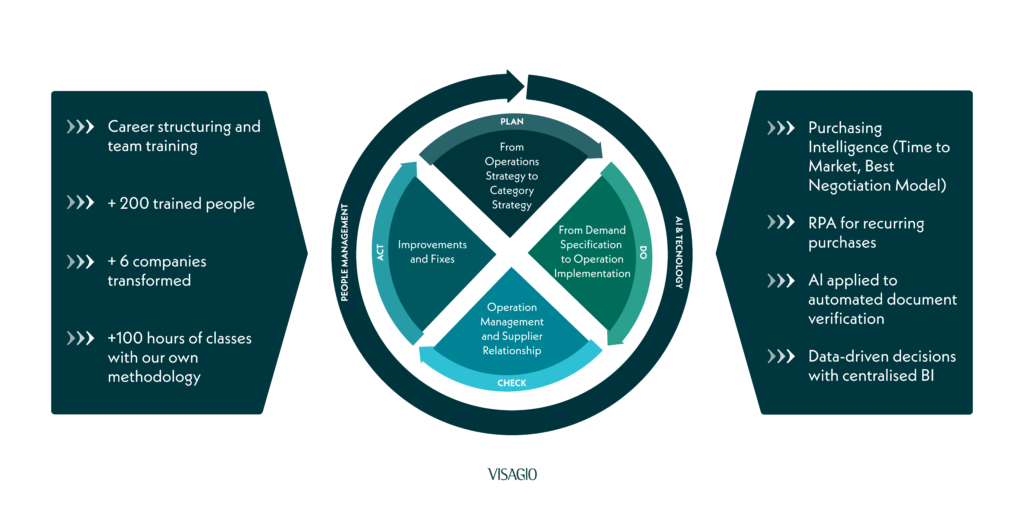

Managing purchasing categories and their suppliers is an ongoing challenge that requires continuous evolution. Effective category management is crucial as it helps organisations consolidate their spending, optimise supplier relationships, and achieve better negotiation outcomes. By applying a methodology based on the PDCA (Plan-Do-Check-Act) cycle, organisations can systematically identify opportunities for improvement, implement changes, monitor results, and refine strategies. This approach ensures that the purchasing and supplier management processes are continually enhanced, driving operational excellence.
The PDCA cycle provides the tools for adaptation and a roadmap towards achieving procurement objectives, enhancing the intelligence and effectiveness of the overall procurement strategy.
3. Procurement 4.0
Procurement 4.0 represents the next evolution in procurement practices, driven by the integration of advanced information technologies and the digitalisation of processes and categories. This transformative approach leverages big data, artificial intelligence, and machine learning to revolutionise how procurement functions. The evolution of information technologies has enabled organisations to access real-time data and insights, enhancing decision-making and strategic planning.
Digitisation of processes streamlines procurement activities, automating routine tasks such as purchase order processing, thus improving efficiency and reducing errors. Additionally, the digitalisation of categories allows for more precise and agile management of sourcing and supplier relationships, ensuring that procurement strategies are adaptable and responsive to market dynamics. By embracing Procurement 4.0, businesses can achieve greater transparency, agility, and competitiveness in their procurement operations.
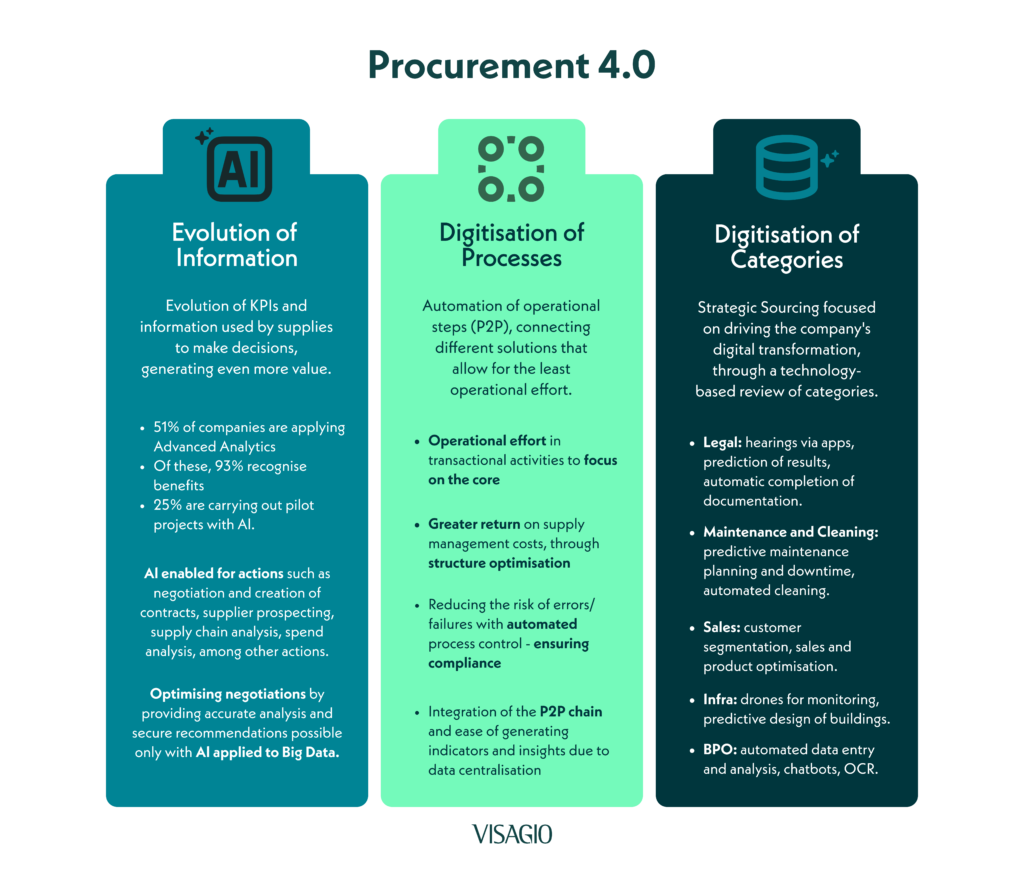

Through Procurement 4.0, Visagio helped businesses to achieve key results such as
- 56% improvement in portfolio health and a 62% reduction in ageing through governance indicators and routines dashboard;
- 90% of purchases with potential suppliers identified based on purchase history and text similarity in material descriptions;
- Facilitated the automatic purchase of over AUD 10 million worth of items via the platform within 18 months, accounting for 17% of total traded volume;
- 30% reduction in operational effort through the implementation of technologies like RPA and workflow portals.
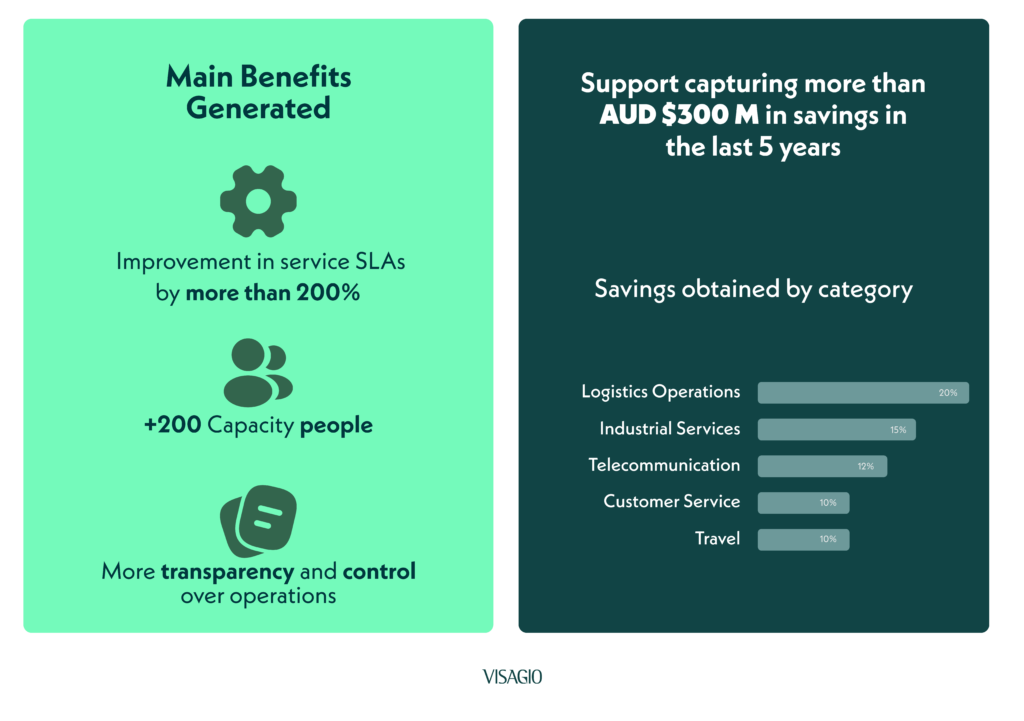

Conclusion
Visagio has a proven success with efficient procurement strategies, delivering benefits through operational optimisation, strategic supplier management, and digital transformation (Procurement 4.0). These methodologies not only drive cost savings and efficiency but also strengthen supplier relationships, positioning businesses for sustained growth and competitiveness. Through these methods, we improve processes by streamlining operations and eliminating inefficiencies, enhance data and technology by leveraging advanced analytics and automation, foster innovation by adopting cutting-edge procurement solutions, and empower people through continuous training and development.
Find out more about how Visagio can help you start this journey. Message us at contact@visagio.com.
About the author
Josh Jiang is a management consultant at Visagio with extensive experience in implementation projects, developing and applying solutions in various areas such as post-merger integration, global services provider, procurement, financial modeling and customer experience. He has worked across a broad range of industry sectors, including mining, financial services, technology and the not-for-profit sector.


